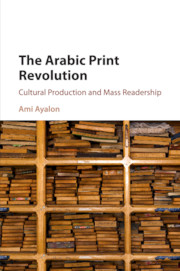Book contents
- Frontmatter
- Dedication
- Contents
- Preface and Acknowledgments
- Introduction
- 1 The Formative Phase of Arab Printing: A Historical Overview
- 2 Printers and Publishers
- 3 Books, Journals, Cartes de visite
- 4 Diffusion Channels
- 5 Advancing Circulation
- 6 Reading and Readers
- 7 Reading in Public
- Conclusion
- Bibliography
- Index
3 - Books, Journals, Cartes de visite
Published online by Cambridge University Press: 05 September 2016
- Frontmatter
- Dedication
- Contents
- Preface and Acknowledgments
- Introduction
- 1 The Formative Phase of Arab Printing: A Historical Overview
- 2 Printers and Publishers
- 3 Books, Journals, Cartes de visite
- 4 Diffusion Channels
- 5 Advancing Circulation
- 6 Reading and Readers
- 7 Reading in Public
- Conclusion
- Bibliography
- Index
Summary
Perhaps the greatest achievement of Aldus Manutius (1449–1515), the most famous of early European printers, was the redeeming of old literary treasures. As a scholar of Greek linguistics and literature, Aldus's priority was to commit works of ancient Greek civilization to print and save them from oblivion. With the help of hired Cretan scribes, he issued Greek dictionaries and grammars; published the philosophy of Plato and Aristotle; printed literary pieces by Homer, Sophocles, and Aristophanes; brought out the histories of Herodotus and Thucydides; and printed other precious works, thus assuring their preservation. The Aldine Press also printed works in Latin and Italian, including ancient writings such as the letters of young Pliny and rhetoric of Quintilian, and literary works by renaissance luminaries such as Dante and Petrarch that had already been considered classics by then. As a secondary priority and on a more limited scale, his press printed writings by contemporaries, most famously Erasmus. To a first-generation printer, these were obvious choices: using the new technology first to bring old treasures to light, and second to make valuable contemporary writings accessible to the public. Business concerns underlay these priorities, above all the drive to produce texts that were in high demand as manuscripts, so as to assure profit. In the process, Aldus and his colleagues also labored to upgrade the appearance of books, setting the mold for their improved future format (some old basic attributes were preserved – the codex format, binding, use of illustrations, and some important aspects of text layout). They made old objects in a new dress: old and familiar in contents, similar but distinct in appearance, and all too novel in production pace, quantities, and attainability.
Early Arab printers similarly relied in their pioneering endeavors on a rich literary heritage. Twelve hundred years of creativity yielded a vast pool of writings in the languages of Islam, in every field of human knowledge. Only a segment of it, an unknown share of the whole but a very considerable corpus in itself, had remained as the Middle East was about to enter the age of printing; the rest had perished under rough circumstances. An extensive account of this remaining corpus is a task for another study, but it is possible here to point out its main categories, which will help us later in the chapter.
- Type
- Chapter
- Information
- The Arabic Print RevolutionCultural Production and Mass Readership, pp. 69 - 96Publisher: Cambridge University PressPrint publication year: 2016

